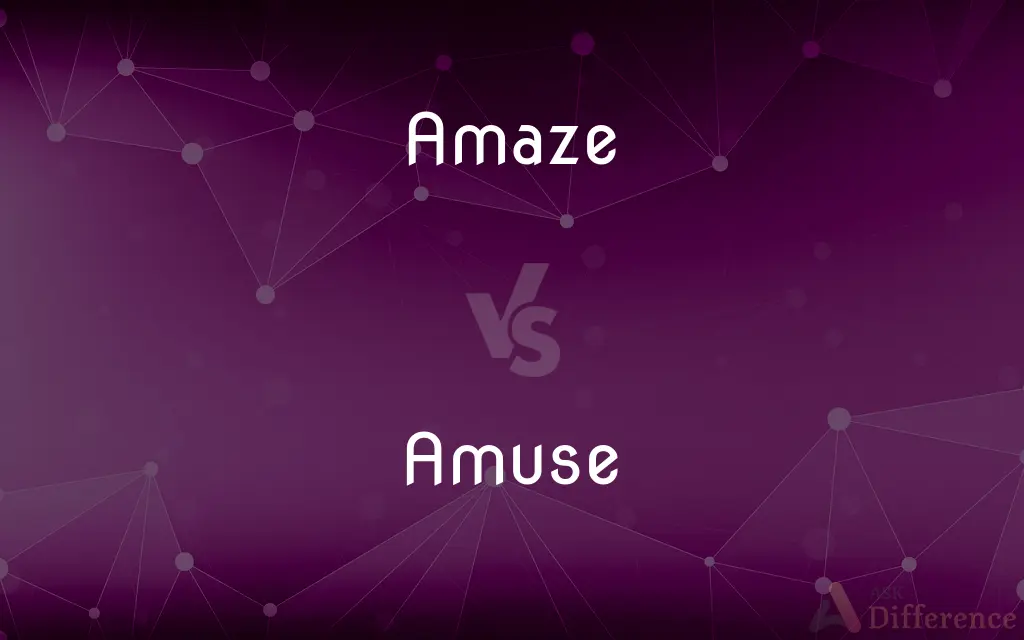Amaze vs. Amuse — What's the Difference?
Edited by Tayyaba Rehman — By Urooj Arif — Updated on March 27, 2024
Amaze involves causing great surprise or wonder, while amuse is about providing entertainment or laughter.

Difference Between Amaze and Amuse
Table of Contents
ADVERTISEMENT
Key Differences
Amaze implies a reaction of astonishment or wonder, often due to something unexpected or extraordinary. It's a deeper, sometimes profound response to witnessing or experiencing something truly surprising or impressive. On the other hand, amuse focuses on the lighter side of engagement, aiming to entertain or make someone laugh. It's about enjoyment and the pleasure derived from light-hearted entertainment or humor.
While amaze touches on a deeper emotional level, often leading to awe or admiration, amusement is associated with joy, fun, and the pleasure of being entertained. The former can leave a lasting impression of wonder, whereas the latter is about the joy of the moment.
Amazement often comes from encountering the extraordinary or the sublime, such as breathtaking natural wonders or incredible feats. In contrast, amusement is found in everyday joys, humor, and entertainment, from jokes and stories to amusing situations.
The impact of amazement can be long-lasting, shaping memories and experiences with its profound effect. Amusement, while delightful, tends to offer a more fleeting pleasure, remembered with a smile but often less transformative.
Comparison Chart
Motional Response
Astonishment, wonder
Laughter, enjoyment
ADVERTISEMENT
Depth of Effect
Profound, can be life-changing
Light-hearted, momentary
Source
Extraordinary events or achievements
Humorous, entertaining situations
Duration of Impact
Long-lasting, memorable
Short-lived, but can be recalled with fondness
Purpose
To invoke awe or admiration
To entertain or make someone laugh
Compare with Definitions
Amaze
To fill someone with wonder or astonishment.
The magician's act was so extraordinary, it amazed the entire audience.
Amuse
To entertain someone, especially with humor.
The comedian's quick wit amused the crowd throughout the evening.
Amaze
Causing great surprise or unexpected wonder.
The sunset over the mountains amazed the travelers, leaving them speechless.
Amuse
Refers to the act of creating enjoyment in a pleasant way.
To amuse his guests, he shared amusing anecdotes from his travels.
Amaze
Implies a response to something truly remarkable.
The child was amazed at the sight of the night sky filled with stars.
Amuse
Can suggest a way to pass time enjoyably.
She found ways to amuse herself during the long flight by watching comedies.
Amaze
Often related to witnessing something spectacular.
The complexity and beauty of the ancient artifact amazed the archaeologists.
Amuse
Causing laughter or enjoyment through light-hearted fun.
The playful puppy amused the children, making them laugh with its antics.
Amaze
Can refer to a feeling of being overwhelmed by admiration.
She was amazed by her mentor's ability to solve complex problems effortlessly.
Amuse
Often involves a clever or entertaining element.
His ability to amuse with clever wordplay made him popular at parties.
Amaze
To affect with great wonder; astonish.
Amuse
To hold the attention of or occupy in an agreeable fashion
Amused myself with a puzzle.
Amaze
(Obsolete) To bewilder; perplex.
Amuse
To cause to laugh or smile by being funny
Amused the crowd with jokes.
Amaze
To cause great wonder or astonishment
A sight that amazes.
Amuse
(Archaic) To delude or deceive.
Amaze
Amazement; wonder.
Amuse
(transitive) To entertain or occupy (someone or something) in a pleasant manner; to stir (an individual) with pleasing emotions.
I watch these movies because they amuse me.
It always amuses me to hear the funny stories why people haven't got a ticket, but I never let them get in without paying.
Amaze
(transitive)
Amuse
To cause laughter or amusement; to be funny.
His jokes rarely fail to amuse.
Amaze
To fill (someone) with surprise and wonder; to astonish, to astound, to surprise.
He was amazed when he found that the girl was a robot.
Amuse
To keep in expectation; to beguile; to delude.
Amaze
(obsolete) To stun or stupefy (someone).
Amuse
To occupy or engage the attention of; to lose in deep thought; to absorb; also, to distract; to bewilder.
Amaze
To bewilder or perplex (someone or oneself).
Amuse
To occupy or engage the attention of; to lose in deep thought; to absorb; also, to distract; to bewilder.
Camillus set upon the Gauls when they were amused in receiving their gold.
Being amused with grief, fear, and fright, he could not find the house.
Amaze
To fill (someone) with panic; to panic, to terrify.
Amuse
To entertain or occupy in a pleasant manner; to stir with pleasing or mirthful emotions; to divert.
A group of children amusing themselves with pushing stones from the top [of the cliff], and watching as they plunged into the lake.
Amaze
To experience amazement; to be astounded.
Amuse
To keep in expectation; to beguile; to delude.
He amused his followers with idle promises.
Whatever amuses serves to kill time, to lull the faculties, and to banish reflection. Whatever entertains usually awakens the understanding or gratifies the fancy. Whatever diverts is lively in its nature, and sometimes tumultuous in its effects.
Amaze
(archaic)
Amuse
To muse; to mediate.
Amaze
Amazement, astonishment; (countable) an instance of this.
Amuse
Occupy in an agreeable, entertaining or pleasant fashion;
The play amused the ladies
Amaze
(uncountable) Fear, terror.
Amuse
Make (somebody) laugh;
The clown amused the children
Amaze
Stupefaction of the mind; bewilderment; (countable) an instance of this.
Amaze
To bewilder; to stupefy; to bring into a maze.
A labyrinth to amaze his foes.
Amaze
To confound, as by fear, wonder, extreme surprise; to overwhelm with wonder; to astound; to astonish greatly.
And all the people were amazed, and said, Is not this the son of David?
Amaze
To be astounded.
Amaze
Bewilderment, arising from fear, surprise, or wonder; amazement.
The wild, bewilderedOf one to stone converted by amaze.
Amaze
Affect with wonder;
Your ability to speak six languages amazes me!
Amaze
Be a mystery or bewildering to;
This beats me!
Got me--I don't know the answer!
A vexing problem
This question really stuck me
Common Curiosities
What is the key difference between amaze and amuse?
The key difference lies in the emotional response: amaze is about causing wonder or astonishment, while amuse is about entertaining or making someone laugh.
Is amazement always positive?
While amazement is typically positive, reflecting wonder and admiration, it can also stem from shock or disbelief in negative contexts.
Are there specific contexts where one is more appropriate than the other?
Amaze is more fitting for situations invoking awe or significant surprise, whereas amuse is better for scenarios focused on enjoyment and laughter.
Can something amaze and amuse at the same time?
Yes, it's possible for something to both amaze and amuse, especially if it's both extraordinary and humorous.
Is it easier to amuse than to amaze?
Generally, amusing someone might be easier as it involves light-hearted entertainment, while amazing someone typically requires something extraordinary or unexpected.
How do you choose between using amaze or amuse in a sentence?
Choose based on the desired emotional impact: use amaze for expressing wonder and amuse for indicating entertainment or laughter.
How do cultural differences affect what amazes or amuses people?
Cultural backgrounds can influence what individuals find amazing or amusing, as perceptions of humor and wonder vary across different societies.
Can the feeling of being amazed last longer than being amused?
Yes, feelings of amazement can have a longer-lasting impact, as they often relate to more profound or extraordinary experiences.
Do amaze and amuse share any similarities?
Both involve a positive emotional response and can enrich experiences, though they operate on different levels of emotional depth.
Can animals be amazed or amused?
Animals can show behaviors that suggest they experience forms of amusement, especially in play; amazement, as humans experience it, may not be as applicable.
Share Your Discovery

Previous Comparison
Provost vs. Rector
Next Comparison
Cut vs. PickAuthor Spotlight
Written by
Urooj ArifUrooj is a skilled content writer at Ask Difference, known for her exceptional ability to simplify complex topics into engaging and informative content. With a passion for research and a flair for clear, concise writing, she consistently delivers articles that resonate with our diverse audience.
Edited by
Tayyaba RehmanTayyaba Rehman is a distinguished writer, currently serving as a primary contributor to askdifference.com. As a researcher in semantics and etymology, Tayyaba's passion for the complexity of languages and their distinctions has found a perfect home on the platform. Tayyaba delves into the intricacies of language, distinguishing between commonly confused words and phrases, thereby providing clarity for readers worldwide.














































